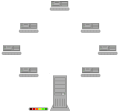Copyright infringement
Copyright infringement is a legal term referring to the unauthorized use of copyrighted material in a manner that violates one of the copyright owner's exclusive rights, such as the right to reproduce or perform the copyrighted work, or to make derivative works that build upon it.
Overview[edit]
The copyright law grants owners an exclusive right to control the use of their works in a number of ways, such as the right to reproduce, distribute, display and perform their works. Unauthorized use of these works in any of these ways constitutes copyright infringement.
Types of Copyright Infringement[edit]
There are two types of copyright infringement: direct and indirect.
Direct infringement occurs when a person directly violates one of the copyright owner's exclusive rights. For example, if a person copies and distributes a copyrighted book without the owner's permission, that person is directly infringing the copyright.
Indirect infringement occurs when a person contributes to or benefits from the infringement by another person. For example, if a person sells a device that enables others to copy and distribute copyrighted works without the owner's permission, that person is indirectly infringing the copyright.
Legal Consequences[edit]
The legal consequences of copyright infringement can be severe. They can include monetary damages, injunctions to stop the infringing activity, and in some cases, criminal penalties.
Defenses[edit]
There are several defenses to copyright infringement, including fair use, the doctrine of first sale, and the de minimis doctrine.
Fair use is a defense that allows limited use of copyrighted material without the owner's permission, for purposes such as criticism, comment, news reporting, teaching, scholarship, and research.
The doctrine of first sale allows the owner of a legally acquired copy of a copyrighted work to sell or otherwise dispose of that copy.
The de minimis doctrine is a defense that the infringement is so trivial that the law does not take notice.
See Also[edit]
Ad. Transform your life with W8MD's Budget GLP-1 injections from $75


W8MD offers a medical weight loss program to lose weight in Philadelphia. Our physician-supervised medical weight loss provides:
- Weight loss injections in NYC (generic and brand names):
- Zepbound / Mounjaro, Wegovy / Ozempic, Saxenda
- Most insurances accepted or discounted self-pay rates. We will obtain insurance prior authorizations if needed.
- Generic GLP1 weight loss injections from $75 for the starting dose.
- Also offer prescription weight loss medications including Phentermine, Qsymia, Diethylpropion, Contrave etc.
NYC weight loss doctor appointmentsNYC weight loss doctor appointments
Start your NYC weight loss journey today at our NYC medical weight loss and Philadelphia medical weight loss clinics.
- Call 718-946-5500 to lose weight in NYC or for medical weight loss in Philadelphia 215-676-2334.
- Tags:NYC medical weight loss, Philadelphia lose weight Zepbound NYC, Budget GLP1 weight loss injections, Wegovy Philadelphia, Wegovy NYC, Philadelphia medical weight loss, Brookly weight loss and Wegovy NYC
|
WikiMD's Wellness Encyclopedia |
| Let Food Be Thy Medicine Medicine Thy Food - Hippocrates |
Medical Disclaimer: WikiMD is not a substitute for professional medical advice. The information on WikiMD is provided as an information resource only, may be incorrect, outdated or misleading, and is not to be used or relied on for any diagnostic or treatment purposes. Please consult your health care provider before making any healthcare decisions or for guidance about a specific medical condition. WikiMD expressly disclaims responsibility, and shall have no liability, for any damages, loss, injury, or liability whatsoever suffered as a result of your reliance on the information contained in this site. By visiting this site you agree to the foregoing terms and conditions, which may from time to time be changed or supplemented by WikiMD. If you do not agree to the foregoing terms and conditions, you should not enter or use this site. See full disclaimer.
Credits:Most images are courtesy of Wikimedia commons, and templates, categories Wikipedia, licensed under CC BY SA or similar.
Translate this page: - East Asian
中文,
日本,
한국어,
South Asian
हिन्दी,
தமிழ்,
తెలుగు,
Urdu,
ಕನ್ನಡ,
Southeast Asian
Indonesian,
Vietnamese,
Thai,
မြန်မာဘာသာ,
বাংলা
European
español,
Deutsch,
français,
Greek,
português do Brasil,
polski,
română,
русский,
Nederlands,
norsk,
svenska,
suomi,
Italian
Middle Eastern & African
عربى,
Turkish,
Persian,
Hebrew,
Afrikaans,
isiZulu,
Kiswahili,
Other
Bulgarian,
Hungarian,
Czech,
Swedish,
മലയാളം,
मराठी,
ਪੰਜਾਬੀ,
ગુજરાતી,
Portuguese,
Ukrainian








